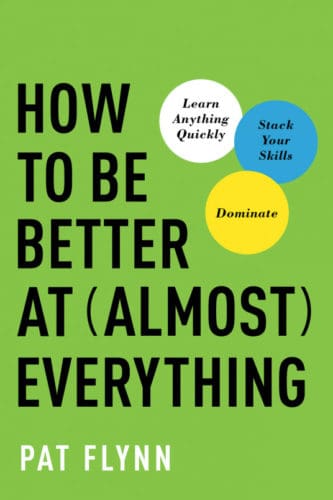We all want to be better at what we do. It’s the appeal that self-help books sell themselves with and the main offer of the book How To Be Better At (Almost) Everything: Learn Anything Quickly, Stack Your Skills, Dominate. The problem is, this book really needs the very thing is claims to offer, as it’s not even close to on-track.
How To Be Better At (Almost) Everything
While we’d all like to be better at many of the things we do, the promise of How To Be Better At (Almost) Everything by Pat Flynn is so off the mark that it’s not even worth the read. It’s filled with advice that goes against what countless others have offered. While a majority shouldn’t be trusted simply because they’re a majority, the success and following those folks have found lends far more to their advice than any offered in this book.
Here are just some of the issues with the “advice” given throughout the book.
Brimming With Bad Advice
Despite the piles of research on the benefits of specialization, a key principal of the book is that it’s better to be good at many things than great at one.
The author takes a narrow-minded view of specialization in believing that to specialize means you can only be great at one thing, rather than great at many things which add up to an even larger whole.
Stories are related in a way only high school kids tell them. “He said this. I said that. He told me this. I replied this.” There’s a reason people don’t generally tell stories in this manner. They’re hard to follow and sound silly.
Far Less Than Everything
While the title mentions “almost everything”, the author talks about nearly nothing but working out and taekwondo. Only on rare occasion are any other examples mentioned. At one point “business” is given as an example, without specificity beyond that.
This book is all about Pat Flynn. You’ll hear constant stories about him. It’s like Tony Robins in a late-night motivational infomercial, without the fame, fortune, or successful track record. Unless you’re already a member of his fan-club, you’ll quickly get tired of hearing about him in less-than interesting stories.
Not Pushing Enough
The author argues that you should only try to be at very most, 80% good at something. The extra 20% does little to move the needle and shouldn’t be invested in. But there’s a big problem with that limit.
If we look at his countless workout-related examples, we see the issue. You can never improve if you only do 80%. Pushing your muscles to 80% when lifting will never increase your lifts with time. There’s a reason that weight lifters push themselves near or to exhaustion when they lift. No athlete does just 80% to improve.
After going on about this 80/20 rule early on, the author himself talks about the need to push yourself to get better. 80% isn’t pushing yourself.
Would you want to go through life knowing you only ever accomplished 80% of your potential? That’d be pretty sad.
Failing To Be Better
Improvement is an important part of life and there are countless strategies to grow our own abilities. Sadly, How To Be Better At (Almost) Anything fails to offer anything meaningful to advancing ourselves. It takes a short view of the opportunities available to us and dispenses bad advice. Look elsewhere for enlightenment.
Though I wouldn’t recommend it, if you still want to check it out, you can grab a copy of How To Be Better At (Almost) Everything here on Amazon.

